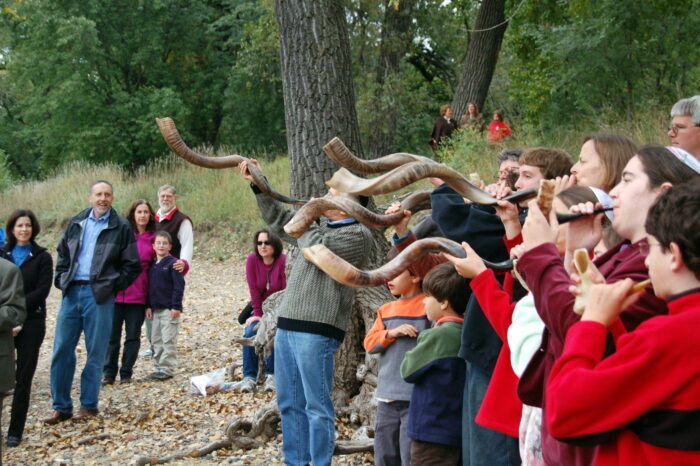Last month my family traveled to Maryland to celebrate my dad’s 85th birthday. The majority of our family was in attendance: all of the kids and grandkids, minus two who had already returned to university. It had been a full year since the last large family gathering. After such a long passage of time, I find myself stunned by new observations: the beginning of gray hair emerging on the sideburns of my baby brother, the light age spot on the cheek of my younger sister, the shrinking height of my parents, and the maturation of the grandchildren. All of it marking the passing of time.
Of course, I see the aging process in myself, too. It’s just that I see myself every day, and so the noticing is not as stark. Perhaps you have experienced this, too? Have you woken up one morning, only to notice a new ache or pain that was not there the day before? While these changes usually occur gradually, we mostly don’t notice them until we notice them. But seeing the physical changes in another, especially in our dear ones whom we have not seen in months or even years, stops us in our tracks.
The majority of us move through our days not fully cognizant of how quickly the years pass. We go about our lives planning and rushing, rarely taking time for noticing, pausing, and reflecting. I remember raising my now adult children and hearing the most fitting adage: “Long days, short years.” The around the clock care of an infant, the long hours of entertaining a toddler, the wondering, “When will it ever end?” And then, before you blink your eyes, they fly the coop.
One of the gifts Judaism offers us is the invitation to stop and pause, to notice and reflect, to welcome and appreciate. We experience this gift each week with the arrival of Shabbat, and at this time of year with the month of Elul. In preparation for the High Holidays, we use Elul, the month preceding the arrival of the High Holidays, to reflect on and review our actions over this past year.
In addition to this process of introspection, it is customary to blow the shofar each morning (with the exception of Shabbat and the day before Rosh Hashanah). The shofar blasts jolt us from our regular routines, our everyday habits and behaviors. As humans we often need cues that prompt us to stop and pause, notice and reflect, welcome and appreciate. Whether they are physical signs which illustrate the passage of time or loud shofar blasts, both serve as ways to awaken us, to rouse us from our slumber.
The work of Elul grants us the opportunity to contemplate when we missed the mark and when and how to do teshuvah, ![]() . Teshuvah, most often translated as repentance, can also mean “to return” or “to turn back,” originating from its root, shuv. Personally, I like to think of teshuvah as a recalibration. Teshuvah is the process of returning, shuv, to the Hay
. Teshuvah, most often translated as repentance, can also mean “to return” or “to turn back,” originating from its root, shuv. Personally, I like to think of teshuvah as a recalibration. Teshuvah is the process of returning, shuv, to the Hay ![]() with the Hebrew letter, hay, representative of Hashem, God, the Holy One of Blessing. The process of returning to the Holy One.
with the Hebrew letter, hay, representative of Hashem, God, the Holy One of Blessing. The process of returning to the Holy One.
When we return or re-orient ourselves toward God, we recalibrate to the true essence of who we are. We are n’shamot—souls. Souls having a human experience.
Deep breath, inhale…return to your Essence.
Deep breath, exhale…return to the Source.
Return to the hay that is inside of you, the God-spark.
Teshuvah enables us to reconnect to our inherent goodness, the pure part of ourselves. In the morning blessings, we say Elohai Neshama shenata bi tehorah hee: The soul that you my God placed within me is pure. We return to our soul, to our own inner light, to our true being.
In the book of Genesis, after God created human beings, the Torah says,
![]() And God saw all that had been made, and found it very good.
And God saw all that had been made, and found it very good.
We were created good—very good. Yes, we must do the hard work of a soul-accounting. But in that process, I’d like to offer a gentle invitation to remember not only the times when we missed the mark, but also the times when we hit the target. When we harken back to these teachings, we remember that indeed our souls are pure, and that we were created good, even if we happen to shmutz ourselves up from time to time.
Elul is the month that rouses us from our slumber and awakens us to notice that we have journeyed another year around the sun. Elul is the time for us to reflect on how we have acted in the past and how we want to act in the future. May these Elul gleanings be rooted into the rest of the year, prompting us to stop and pause, notice and reflect, welcome and appreciate the many unnoticed blessings that suffuse our lives, as the clock continues to tick.
Photo credit: Sank63, CC BY-NC-ND 2.0

